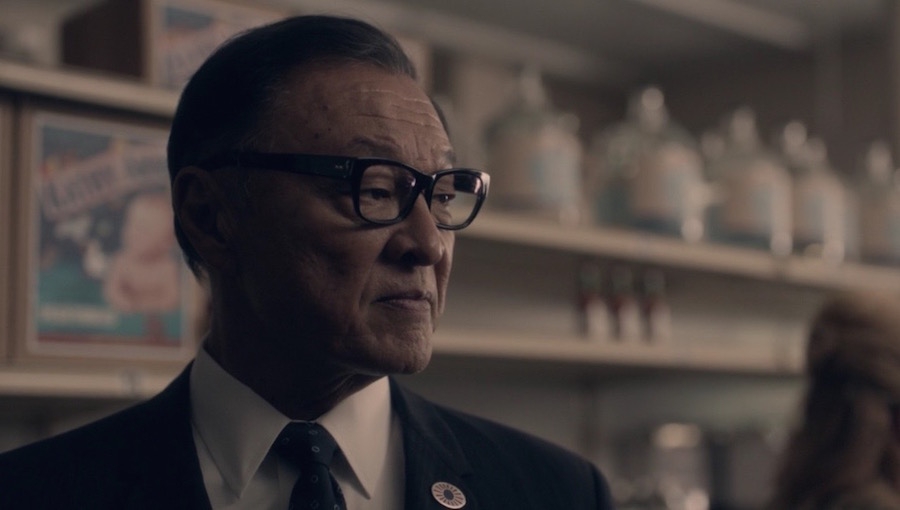The sixth episode is titled “Kintsugi,” which is a Japanese artistic practice of repairing broken pottery while keeping the cracks visible, which is meant to create visual historicity in the object. While this is potentially a literal reference to the broken teacup that Tagomi (Cary-Hiroyuki Tagawa) finds in alternate America, it also serves as a metaphor that spans the entire show. Each group—the Nazis, the Japanese, and the Resistance—actually denies the reparation of the broken nation. While each group continues to disrupt the agenda of another, America seems more and more likely to be beyond repair. The groups end up being more destructive rather than restorative, and the potential annihilation of San Francisco that was foreshadowed in the man in the high castle’s film would effectively eradicate much historical evidence of Japanese influence in America.
For Team Resistance, George (Tate Donovan) wants Juliana (Alexa Davalos) to go undercover, which will hopefully add some depth to her character. Juliana has been on the run and looking for answers for two seasons. Now, she has the opportunity to infiltrate the Reich through her relationship with the Smith family. Since Juliana’s character seems completely void of emotion, she probably would do well as a spy; however, if Juliana learns of Thomas’ (Quinn Lord) condition, she could completely exploit Obergruppenführer Smith (Rufus Sewell) and his family. Part of the brilliance of this show is the way it can play with the audience’s sentiments, as Thomas’ situation actually incites grief for the Smith family, making it harder to root for Juliana to succeed.
Meanwhile, Joe (Luke Kleintank) goes romping around in nature with Nicole (Bella Heathcote), the most stylishly dressed character on the show. The costumes, in general, are rather striking and very fitting for this universe. Mrs. Smith (Chelah Horsdal) and her bridge club members dress in classic 1960s dresses. Juliana’s shopping trip with Lucy (Emily Holmes) includes a parade of dresses through a fancy boutique. The Nazi uniforms and even Thomas’ school uniform are commanding, especially with the armband that has a swastika over red and white stripes. On the west coast, Tagomi’s thick black-rimmed glasses give his character the look of a perfect professional dimension traveler.
Joe’s drug trip scene is visually bizarre and compelling, as images are either blurred or enhanced through lighting techniques. As the audience sees through Joe’s eyes, they gain access to a version of reality under the influence of drugs. Joe hallucinates Juliana telling him that she is alive. Ironically, then, Joe learns truth in this state, though he dismisses it when he sobers up. This further suggests that altered versions of reality are the best access points to truth. Joe still seems to be trying to find meaning in his life, and the episode ends with him, yet again, considering his loyalties. This dilemma has run its course and is just prolonging Joe’s absence from America. The writers seem to be out of things to do with Joe at this point. The drug trip is artistically appealing but does not offer us any further progress with his character. Joe is stuck in a rut, and it has been long enough.
While the storylines have been completely disjointed this season, Episode 6 ends with a stunning montage of the key players from this episode while a speech delivered by JFK during the Cuban Missile Crisis plays in the background. Kennedy’s message is a call for peace with the Soviet Union. And while it only actually exists in the alternate version of America, Kennedy’s words may also apply to the current state of the show’s Earth-1 America. While the Nazis, the Japanese, and the Resistance continue to prepare to attack one another, Kennedy reminds us that in times such as these, peace is the better option. This is a well edited, moving scene that delivers a powerful message, but, unfortunately, it seems unlikely that peace is an option for this reality’s future.

